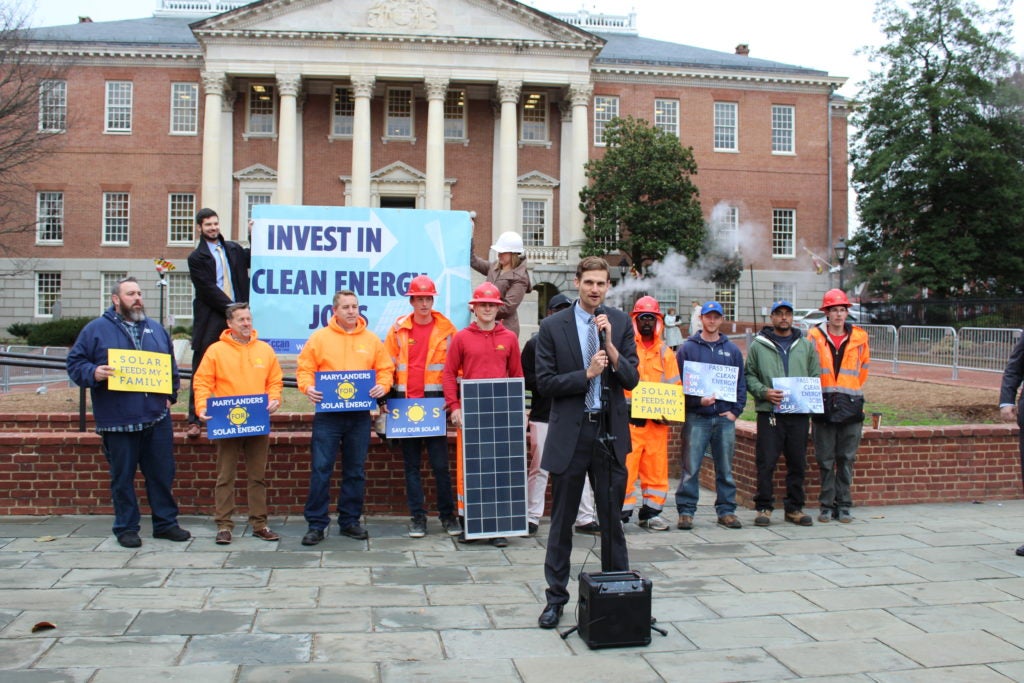Solar supporters push clean energy bills forward in Maryland

Maryland’s General Assembly hears thousands of pieces of legislation each session in a period of just three months. Our network of solar supporters was in the thick of it from day one.
Day one of the legislative session kicked off with a group of solar supporters joining advocates from around the state at a rally for the Clean Energy Jobs Act (CEJA). This rally was filled with strong voices advocating not only for an expanded renewable portfolio standard (RPS), 50% renewable energy by 2030, but also to stop the subsidizing of trash incineration within that RPS. Before the session began, though, I met with members of Solar United Neighbors of Maryland’s Action Team Steering Committee to discuss our legislative priorities for this year’s session. Below are the priorities we decided on:
2019 Maryland Legislative Priorities
Clean Energy Jobs Act (SB 516/HB 1158)
- Increases the state’s RPS to 50% by 2028.
- Includes a nation-leading 14.5% solar carve-out, creating an estimated 5,000 MW in new, in-state solar installations.
- A 50% RPS will produce estimated 20,000 new Maryland jobs through 2028.
- Maryland’s Climate Action Plan found that the existing RPS, 25% by 2020, is already expected to generate $6.4 billion in net economic output, and $4.3 billion in wages over the lifetime of the program.
Community Solar Pilot extension (SB 520 /HB 683)
- Extends the initial three-year community solar pilot program through 2024 and pushes the required delivery date for the Public Service Commission’s report on the program until 2022.
- Community, or shared, solar makes it possible for anyone with an electric bill to access solar energy. This is especially important for renters, low- and middle-income residents, and homeowners with buildings that are not suitable for solar installations.
- Extension of the pilot program is necessary because a variety of delays have put it behind schedule. Extending the pilot would allow the legislature to more fully consider the program’s successes and challenges, and more carefully formulate any changes to improve the program.
Electric Vehicle tax credit extension (SB 78)
- Extends the state excise tax credit of up to $3,000 for the purchaser of electric vehicles (EVs) indefinitely (fiscal impact estimated for 5 years). The current excise credit is set to expire next year.
- The current tax credit has been a very popular program and has helped put Maryland in a leadership position in the transition to electrified transportation.
- The extension of this incentive will help ensure Maryland moves forward towards the goals it signed onto when it adopted the zero-emission vehicle (ZEV) state action plan along with California and 11 other states.
- The bill is limited to $3 million in credits per year, to be drawn from the Strategic Energy Investment Fund and the Transportation Trust Fund. The straightforward benefit of this credit is that it enables Marylanders to overcome the additional marginal price premium for electric vehicles. Over the life of the existing incentive, 7,169 EV owners in Maryland have received the credit. Other benefits would include air quality impacts, electricity rate cost reductions over time, market stability, and lower total cost of vehicle ownership for EV driving consumers.
- In addition to SB 78, several other very similar bills extending Maryland’s EV tax credit were also introduced as the legislative session progressed. It appears there is broad support for an extension to the $3,000 credit, but the details of how long that extension lasts and to what extent it is funded are still being negotiated.
What’s next?
The next step is to start reaching out to legislators so that they knew what was important to the people they represent. We set up an action center to help people connect with their representatives easier through our website. We have already had more than 100 individuals contact their state representatives since we launched it late last month.
The relevant legislative committees have heard these three bills over the last few weeks. I had the opportunity to testify in front of both the Maryland House and Senate committees for the community solar extension bill. That bill moved out of the Senate committee with a unanimous favorable report. The CEJA has also moved out of the Maryland Senate Finance Committee with a favorable report and is now headed to the Senate floor for a full vote. SB 78 has been heard by the Senate Budget and Taxation Committee but has yet to receive a vote from the committee. We expect that it or one of its similar counterparts will pass this session.
March 19 is the next important date for this legislative session. That’s Crossover Day, the day when each chamber of the General Assembly sends bills it intends to pass to the other chamber for their vote.
We are down to the home stretch for our legislative priorities this year, which means now is the time to tell your representative that renewable energy, especially solar, must be supported for the sake of our environment, our economy, and our state.
